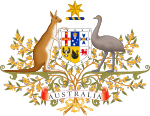Proposed Carbon Pollution Reduction Scheme
A proposed act to introduce a Cap-and-Trade emissions trading scheme to Australia, aimed at being the main element of Australia's climate policy
The Carbon Pollution Reduction Scheme (or CPRS) was a proposed cap-and-trade system of emissions trading for anthropogenic greenhouse gases, due to be introduced in Australia in 2010 by the Rudd government, as part of its climate change policy.[1] It marked a major change in the energy policy of Australia. The policy began when the Australian Labor Party was in opposition and the six Labor-controlled states commissioned an independent review on energy policy, the Garnaut Climate Change Review, which published a number of reports. Labor, after winning the federal election and forming a government, published a Green paper for discussion and comment. The Federal Treasury then modelled some of the financial and economic impacts of the proposed scheme.
The Rudd Government published a final white paper on 15 December 2008. The Government announced that the legislation was intended to take effect in July 2010; but the legislation for the CPRS (aka ETS) failed to gain adequate support and was twice rejected creating a double dissolution election trigger. After a bitter political debate which saw former opposition leader Malcolm Turnbull lose his leadership of the opposition to the anti-CPRS Tony Abbott. The Rudd government did not call an election and the CPRS lost public support. In April 2010, Labor then deferred the CPRS. A successor to the CPRS, the Carbon Pricing Mechanism (CPM) was passed into law as part of the Clean Energy Futures Package (CEF) in 2011, but was repealed in July 2014 following a change in government.[2][3][4]
.

No comments:
Post a Comment